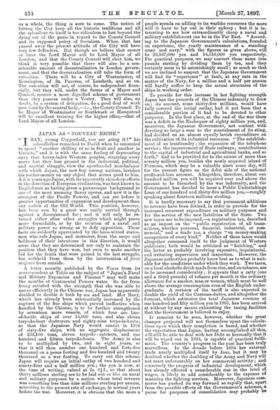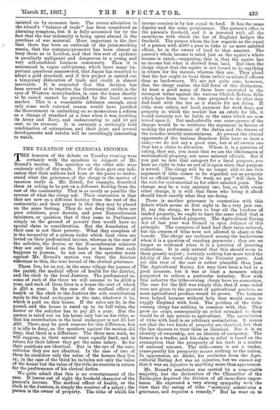JAPAN AS "NOUVEAU RICHE."
"T SAY, young Copperfield, you are going it ! " his schoolfellow remarked to David when he consented to spend "another shilling or so in fruit and another in biscuits," and it is with the same feeling of deprecating envy that heavy-laden Western peoples, straining every nerve lest they lose ground in the industrial, political, and martial struggle, view the openhanded nonchalance with which Japan, the new boy among nations, lavishes his pocket-money on any object that seems good to him. A few years ago Japan, with its apparently skin-deep efforts in the direction of European civilisation, was best known to Englishmen as having given a picturesque background to one of the most amusing Savoy operas, and now it is the strongest of the Pacific Powers, and can see before it greater opportunities of expansion and development than any nation of the Old World. This position, however, has been won by a great war easily carried through -against a disorganised. foe ; and it will only be re- tained either after other struggles which might prove more formidable, or by the creation of a naval and military power so strong as to defy opposition. These facts are evidently appreciated by the keen-witted states- men who rule Japan, and moreover, from the scope and boldness of their intentions in this direction, it would seem that they are determined not only to maintain the position that they have won, but even to make another bid for the fruits that were gained in the last struggle, but withheld from them by the intervention of force snajeure from outside.
A letter recently published by the Times from its correspondent at Tokio on the subject of "Japan's Naval and Military Expansion and Finance" may well make the mouths of Continental Powers water. So far from being satisfied with the strength that she was able to use so efficiently in the Chinese war, Japan has apparently decided to double it both by sea and land. Her Navy, which has already been substantially increased by the capture of the fine ships which proved ineffective when -handled by the Chinese, is to be further strengthened by seventeen more vessels, of which four are line- of-battle ships of over 15,000 tons, and also eleven torpedo-boat destroyers and eighty-nine torpedo-boats; so that the Japanese Navy would consist in 1906 of sixty-five ships, with an aggregate displacement of 233,100 tons, eleven torpedo - catchers, and one hundred and fifteen torpedo-boats. The Army is also to be multiplied by two, and in eight years, so that it will then number one hundred and forty-five thousand on a peace footing and five hundred and twenty thousand on a war footing. To carry out this scheme Japan will require an initial outlay of two hundred and ninety-four and a half million yen ; the yen is now, at the time of writing, valued at 2s. Old., RO that about thirty millions sterling are to be laid out en bloc on naval and military purposes by a nation whose total revenue was something less than nine millions sterling per annum, according to the present rate of exchange, in normal years before the war. Moreover, it is obvious that the more a people spends on adding to its warlike resources the more will it have to lay out in their upkeep ; but it is in- teresting to see how extraordinarily cheap a naval and military establishment can be in the Far East. " Accord- ing to the Japanese Government's calculations, founded on experience, the yearly maintenance of a standing army and navy," with the figures as given above, will be 26,167,000 yen and 14,516,000 yen respectively. For practical purposes, we may convert these sums into pounds sterling by dividing them by ten, and they certainly seem to be astonishingly small ; so much so that we are inclined to suspect that the Japanese Government will find its " experience " at fault, at any rate in the matter of the Navy, for a million and. a half per annum will hardly suffice to keep the actual structures of the ships in working order.
To provide for this increase in her fighting strength Japan has the proceeds of the Chinese indemnity to draw on ; its amount, some thirty-five millions, would have fully covered the initial outlay, had it not been that a considerable portion of it had to be devoted to other purposes. In the first place, at the end. of the war there was a deficit in the Exchequer of eighty million yen, and, moreover, the Japanese Government, not content with devoting so large a sum to the nourishment of its sting, had decided on an almost equally lavish expenditure on the cultivation of its industrial resources. "The establish- ment of an ironfoundry ; the expansion of the telephone service ; the improvement of State railways • contributions to the capital of industrial and agricultural banks, and. so forth," had to be provided for to the extent of more than seventy million yen, besides the newly acquired. island of Formosa, which may be a valuable asset some day, will for the present figure on the debit side of the national profit-and-loss account. Altogether, therefore, about one hundred million yen will be required over and above the amount to be furnished by the war indemnity, and the Government has decided. to issue a Public Undertakings Loan of one hundred and thirty-five million yen,—roughly speaking about fourteen millions sterling.
It is hardly necessary to say that permanent additions to revenue have been devised, in order to provide for the increased. recurrent expenditure on military purposes and for the service of the new liabilities of the State. Two new taxes are to be imposed,—a registration tax, described. as an impost on the "public registration of all trans- actions' whether personal, financial, industrial, or com- mercial," and a trade tax, a charge "on money-making occupations of every kind." Neither of these taxes would altogether commend itself to the judgment of Western publicists ; both would be criticised as "finicking," and the latter as probably involving expensive, inquisitorial, and irritating supervision and inspection. However, the Japanese authorities probably know best as to what is suit- able for the conditions under which they work. Two taxes, on a local alcoholic drink made from rice, and on tobacco, are to be increased considerably ; it appears that a catty (one and a third pounds) of tobacco per month is the ordinary allowance for a smoker, man or woman, which must be well above the average consumption even of the English under- graduate. A revision of the tariff is also expected to double the yield of the Customs-duties, and altogether the forecast, which estimates the total Japanese revenue at one hundred and fifty million yen in 1905, has been arrived, at without by any means exhausting the taxing facilities that the Government is believed to enjoy.
It remains to be seen, however, whether the great changes projected will not themselves upset the calcula- tions upon which their completion is based, and whether the expectation that Japan, having accomplished all this, will still be able to deal with her Debt so heroically that it will be wiped out in 1934, is capable of practical fulfil- ment. The country's progress in the past has been truly marvellous. In the decade before 1894 her external trade nearly multiplied itself by four, but it may be doubted whether the doubling of the Army and Navy will not react unfavourably on her commercial activity ; and conversely the progress of industrial development, which has already effected. a considerable rise in the level of wages, is likely to add considerably to the expense of manning the fighting services. Moreover, Japanese com- merce has pushed its way forward so rapidly that, apart from the possible effects of the Government's schemes, a pause for purposes of consolidation may probably be insisted on by economic laws. The recent alteration in the island's "balance of trade" has been considered an alarming symptom, but it is fully accounted for by the fact that the war indemnity is being spent abroad in the purchase of war material. More important is the fact that there has been an outbreak of the joint-stocking mania, that the company-promoter has been almost as busy there as in London, and that this sort of epidemic is peculiarly malignant and dangerous in a young and very self-confident business community. Then it is announced in vague cablegrams, which leave many im- portant questions unanswered, that Japan has resolved to adopt a gold standard, and if this project is carried out a temporary dislocation of trade and credit is almost inevitable. It is suspected that this decision has been arrived at to improve the Government credit in the eyes of Western moneylenders, in case the loans shortly to be raised cannot be provided by the local money market. This is a reasonable inference enough, since only some such external reason would have justified the Government in embarking on so momentous a reform as a change of standard at a time when it was doubling its Army and Navy, and endeavouring to add 50 per cent. to its revenue. It is certainly a strikingly bold combination of enterprises, and their joint and several developments and results will be exceedingly interesting to watch.







































 Previous page
Previous page